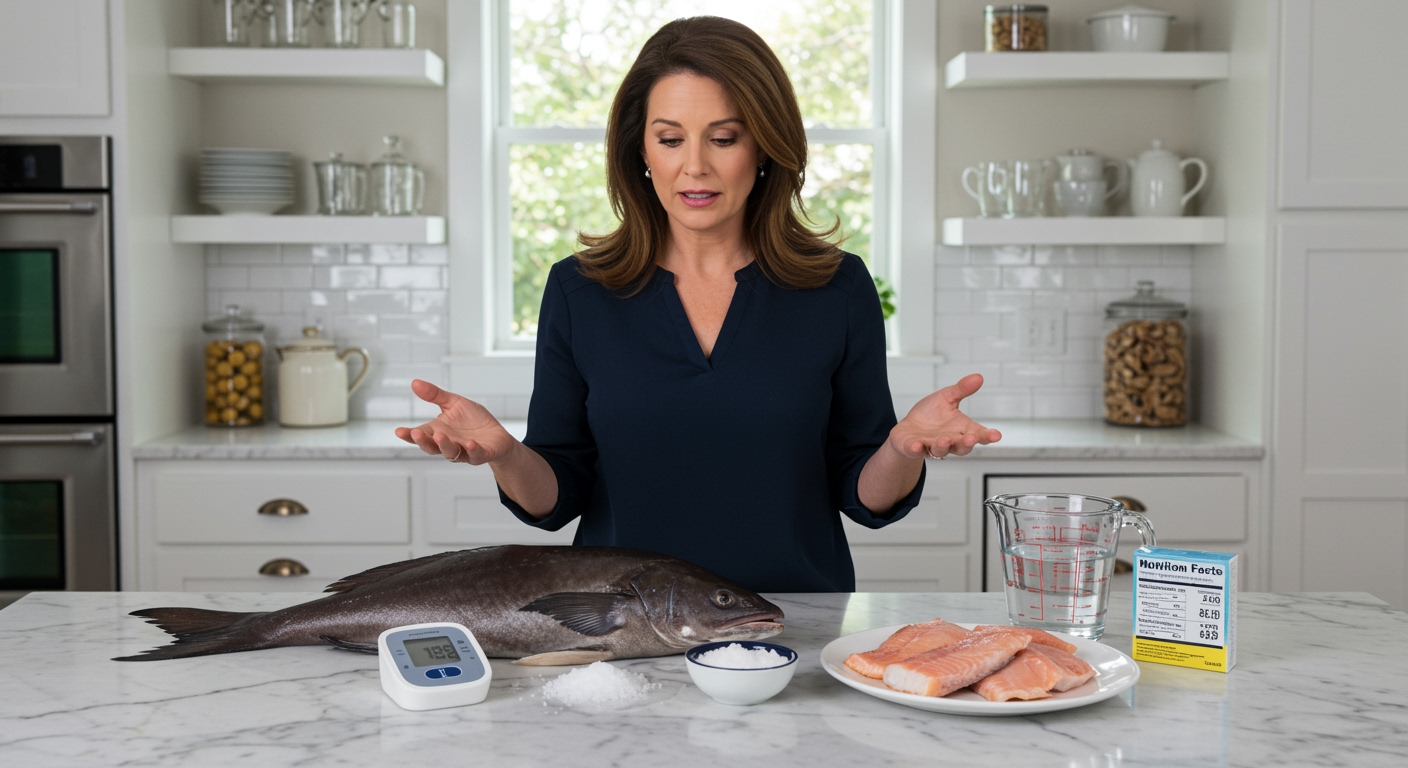✪ Key Takeaway: Cobia fish does not raise blood pressure and may actually help lower it due to its omega-3 fatty acids and low sodium content.
Introduction
You walk into the seafood market and see beautiful cobia fillets on display.
Your doctor told you to watch your blood pressure, and now you wonder if this delicious fish might spike your numbers.
Hi, I’m Abdur, your nutrition coach, and today I’m going to explain exactly how cobia affects your blood pressure and why this concern might be misplaced.
What Makes Cobia Different From Other Fish?
Cobia stands out as a unique marine fish with exceptional nutritional properties that most people overlook.
This fish contains approximately 20 grams of protein per 3.5-ounce serving, making it one of the most protein-dense seafood options available.
The sodium content in fresh cobia remains remarkably low at just 88 milligrams per 100 grams, which is significantly less than many processed foods.
Cobia also provides substantial amounts of omega-3 fatty acids, particularly EPA and DHA, which play crucial roles in cardiovascular health.
These omega-3s help reduce inflammation in blood vessels and support healthy blood flow throughout your circulatory system.
The fish also contains important minerals like potassium and magnesium that work together to regulate blood pressure naturally.
✪ Fact: Cobia contains more protein per serving than salmon while maintaining lower sodium levels than most canned fish varieties.
How Does Cobia Actually Affect Blood Pressure?
Research shows that regular consumption of omega-3 rich fish like cobia can actually help lower blood pressure over time.
The EPA and DHA in cobia work by improving the flexibility of your arterial walls, allowing blood to flow more easily through your circulatory system.
These fatty acids also help reduce the production of inflammatory compounds that can cause blood vessels to constrict and increase pressure.
Studies indicate that people who eat fish rich in omega-3s twice per week show measurable improvements in both systolic and diastolic blood pressure readings.
The potassium content in cobia further supports healthy blood pressure by helping your kidneys remove excess sodium from your bloodstream.
This mineral balance becomes especially important for people who consume higher amounts of processed foods throughout their day.
The magnesium in cobia also contributes to blood pressure regulation by helping your blood vessels relax and maintain proper diameter.
✪ Pro Tip: Aim for two 4-ounce servings of cobia per week to maximize cardiovascular benefits without overdoing mercury intake.
What About Preparation Methods and Blood Pressure?
The way you prepare cobia makes a significant difference in how it affects your blood pressure.
Grilling, baking, or steaming cobia preserves its natural nutritional benefits while avoiding added sodium from breading or heavy sauces.
Frying cobia in oil can reduce the bioavailability of omega-3 fatty acids and may add unnecessary calories that contribute to weight gain.
Excess weight puts additional strain on your cardiovascular system and can lead to elevated blood pressure over time.
Seasoning cobia with herbs and spices instead of salt helps you avoid the sodium overload that many people experience with restaurant preparations.
Fresh lemon juice, garlic, and black pepper enhance the natural flavor of cobia without compromising your blood pressure goals.
✪ Note: Restaurant preparations of cobia often contain 3-4 times more sodium than home-cooked versions due to added seasonings and sauces.
Are There Any Risks With Eating Cobia?
Cobia generally presents minimal risks for most people when consumed as part of a balanced diet.
The mercury content in cobia falls into the moderate category, making it safer than larger predatory fish like shark or king mackerel.
Pregnant women and young children should limit cobia consumption to once per week to avoid potential mercury accumulation.
People taking blood-thinning medications should consult their healthcare provider before increasing their omega-3 intake significantly through fish consumption.
Some individuals may experience allergic reactions to cobia, though this remains relatively uncommon compared to shellfish allergies.
The main concern for blood pressure comes from preparation methods rather than the fish itself, particularly when restaurants add excessive salt or serve large portions.
✪ Pro Tip: Choose wild-caught cobia when possible, as it typically contains higher omega-3 levels and fewer contaminants than farm-raised varieties.
The Bottom Line
Cobia does not raise blood pressure and actually provides cardiovascular benefits through its omega-3 fatty acids, potassium, and magnesium content.
The best fish for your blood pressure is the one you prepare simply and eat regularly, and cobia fits perfectly into this approach when cooked without excessive salt or unhealthy fats.
I would love to hear about your experiences with cobia or any questions you might have about incorporating fish into your blood pressure management plan, so please share your thoughts in the comments below.
References
At NutritionCrown, we use quality and credible sources to ensure our content is accurate and trustworthy. Below are the sources referenced in creating this article:





